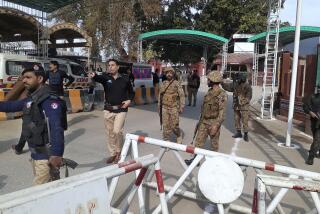In War, Strange Bedfellows Welcomed
STOCKBRIDGE, Mass. — In March 2000, former President Clinton visited Pakistan and declined to shake hands publicly with its military ruler, Gen. Pervez Musharraf, because Musharraf had overthrown a democratically elected government. A day later, Pakistanis were shocked to see Clinton on television again, this time in Geneva, clasping the hands of the Syrian dictator Hafez Assad, whose regime, they knew, was far more repressive than that of any Pakistani military ruler since the founding of their state in 1947.
The democratically elected civilian government that Musharraf had overthrown--that of Punjabi businessman Nawaz Sharif--was notoriously corrupt, as was that of the previous democratic leader Benazir Bhutto. Indeed, Sharif amassed so much money while in office that it was feared he could buy off enough members of the National Assembly to erect a virtual dictatorship under the guise of parliamentary rule. Musharraf’s military coup was initially greeted with relief by many Pakistani intellectuals and human rights campaigners. But the Clinton administration apparently had no time for such nuances. So, it publicly humiliated Pakistan’s ruler, even though he was the most westernized, pro-American officer likely to gain power in the strategically located country.
Musharraf is a Turkophile. He spent part of his youth in Turkey. He idolizes the founder of secular modern Turkey, Kemal Ataturk, and has a dream of turning Pakistan into a South Asian version of Ataturk’s republic. But he is probably too late. Pakistan today is a poverty-wracked Yugoslavia-in-the making--with the added complication of nuclear capability. Islam has failed to provide the binding glue of national identity and, as a consequence, tribal identity has triumphed. Had Musharraf seized power sooner, or had someone like him ruled Pakistan in the 1980s in lieu of military dictator Gen. Mohammed Zia ul-Haq, Pakistan’s situation would have been much better. Zia, politically weak and personally insecure at first, made an early alliance with fundamentalists that has been critical to Pakistan’s institutional decline.
While television may now show Pakistanis as a united group of Muslims demonstrating against Musharraf’s willingness to help America in its struggle against Osama bin Laden, Pakistan is far from united. The current unrest will likely lead to a weakened state, in which Sind in the south, Baluchistan in the southwest, Punjab in the center and the Pashtoon-dominated Northwest Frontier could assert separate identities, with each of those areas weakened by its own clan rivalries and large ethnic minorities. A drought that went on for years has left water and electricity shortages, further inflaming a population that boasts a high percentage of jobless young males.
Bush can pressure Musharraf as much as he likes privately. But, publicly, care has to be taken so that we don’t seem to be bullying the Pakistanis, for that will surely lead to more unrest. Even if Bush combines subtle diplomacy with blunt military force, Pakistan could unravel.
In the best case, the Pakistani military and intelligence establishments could see that the current crisis is their great opportunity to be as useful to the United States as India has been since the end of the Cold War. The U.S. sees India as an important lever against China. Pakistani officers have been fishing around for years looking for a way to put Uncle Sam in their debt. Now Bin Laden has provided it. As a result, Pakistan’s security establishment could decide to try to crush the fundamentalist demon (which, of course, it helped create) in both Afghanistan and Pakistan.
In the worst case, Pakistan could simply descend into warlordism, with cities like Karachi returning to the chronic urban violence that characterized democratic rule in the 1990s. This would unleash a flood of new refugees, as well as recruits for terrorist outfits like Bin Laden’s.
President Bush is now in the awful position of having responsibility for a war on terrorism without having the ability to control many of the events that will occur within it. Nevertheless, he should eschew Clinton’s self-righteous morality of intent and pursue instead a Churchillian morality of consequence in the Middle East and South Asia. Refusing to shake the hand of a military dictator showed good intentions. But leaders who bear responsibility for large groups of people like Clinton, and now Bush, must know that if a policy isn’t successful, it cannot be virtuous. And the public humiliation of an enlightened, pro-Western leader--even one not democratically elected--in such a difficult part of the world is a mistake.
In the coming months, we will find ourselves relying increasingly on dictators such as Musharraf, King Abdullah II in Jordan and others. There simply is no one else with whom to work. We will not be betraying our democratic principles by doing so; quite the contrary. We are fighting not only for own security, but for more open societies in whatever form they may take.
By neglecting the realities of power, and narrowly projecting our own historical experience with democracy onto a country like Pakistan, the Clinton administration did no one any good. To Clinton’s credit, he did agree to visit Pakistan and his private meeting with Musharraf was said to be warm. But there were those close to the administration who wanted him to avoid Pakistan altogether and visit only India, because it had an elected government and Pakistan didn’t. Seeing how important Pakistan is now to our vital interest, such advice was irresponsible to the point of being contemptible. If Bush meets Musharraf, he should firmly clasp his hands in front of the cameras, because Musharraf represents American values to a far greater extent than the previous democratically elected rulers of his country.
More to Read
Sign up for Essential California
The most important California stories and recommendations in your inbox every morning.
You may occasionally receive promotional content from the Los Angeles Times.










